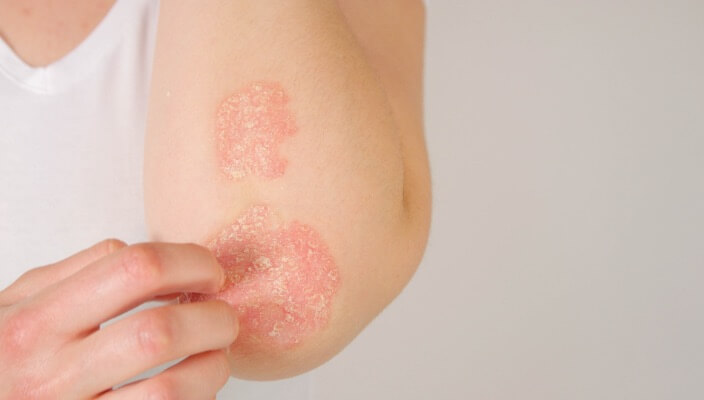Is it Dry Skin...Or Something Else?
How to Distinguish Between Dry Skin and Eczema or Psoriasis
 If you are suffering from dry, itchy skin or patches of red, flakey blotches that interfere with your daily activities and quality of life, it might be more than just normal dry skin. At Cumberland Skin, we often have patients ask, “do I have dry skin or is it eczema/psoriasis?”
If you are suffering from dry, itchy skin or patches of red, flakey blotches that interfere with your daily activities and quality of life, it might be more than just normal dry skin. At Cumberland Skin, we often have patients ask, “do I have dry skin or is it eczema/psoriasis?” While many of these conditions can show similar symptoms, there are a few key ways to distinguish between dry skin and eczema, psoriasis, or dermatitis. Read our guide to better understand how these different skin conditions may appear on your skin.
What Is Dry Skin?
Frequently diagnosed in the United States, dry skin is an uncomfortable skin condition that typically shows up as scaling, itching, dryness, cracking, or rough skin. In most cases, dry skin is caused by external factors, including:
- Hot or cold weather
- Low moisture in the air
- Soaking in hot water
- Harsh chemicals in soap and detergents
Dry skin can affect any area of the body, but it most commonly appears on the hands, arms, and legs.
What Is the Best Treatment for Dry Skin?
The easiest and most effective way to treat dry skin is with over-the-counter lotions and moisturizers. However, this approach may not work for everyone. If OTC treatment is not enough to treat your dry skin, it’s best to visit a board-certified dermatologist for a professional treatment recommendation.
What is Eczema?
Eczema is a chronic skin condition thought to be caused by a combination of genetics and environmental triggers. It is known for causing dry, itchy, red patches on the skin. In the more extreme cases of eczema, it can result in rough, dry patches covering the majority of the body, which can cause debilitating irritation and discomfort that interferes with daily activities, like sleeping and concentrating at work.
Compared to dry skin and psoriasis, eczema has a few distinct symptoms to help you distinguish it from the two other skin conditions.
Typically, eczema is characterized by intense itching and patches of dry, flakey, or scaly skin that may be red or brownish-gray colored. Additionally, eczema may present itself in raised bumps that leak fluid when scratched.
Furthermore, according to research, eczema flare-ups are often triggered by external and internal factors. Triggers may include stress, temperature changes, harsh chemicals, scented products, cigarette smoke, external allergens (i.e. pollen or dust mites), rough scratchy material (i.e. wool), synthetic fabrics, and sweating.
What Is the Best Treatment for Eczema?
While there is no cure for eczema, there are certain steps and treatments you can include in your daily lifestyle to mitigate flare ups. Your doctor will choose the right eczema treatment plan for you based on your symptoms and the severity of the skin condition, but it will most likely include one of the following:
- Topical or oral medication
- Light therapy
- Lifestyle changes
For more information on how we treat eczema at Cumberland Skin, reach out to one of our board-certified dermatologists.
What Is Psoriasis?
Unlike normal dry skin and eczema, which are often primarily influenced by environmental factors, psoriasis is an autoimmune disease that changes the life cycle of skin cells. It is characterized by the rapid buildup of cells on the surface of the skin, causing the formation of thick, silvery, scaly patches and itchy, dry, red skin.
The most distinct symptom of psoriasis is raised, red patches of skin covered with silvery scales. Additional signs and symptoms can vary from person to person but usually include one or more of the following:
- Small, scaly spots (commonly seen in children)
- Dry, cracked skin that may bleed
- Itching, burning or soreness
- Thickened, pitted, or ridged nails
- Swollen and stiff joints
What Is the Best Treatment for Psoriasis?
At Cumberland Skin, our board-certified dermatologists build personalized psoriasis treatment plans for individual patients to help alleviate their psoriasis symptoms and reduce the chances of psoriasis flare-ups.
Our personalized treatments plans include a combination of medication – topicals, creams, and oral prescriptions – and lifestyle recommendations to help patients experience relief.

Get a Professional Diagnosis at Cumberland Skin
If you’re trying to figure out whether you have dry skin or something more serious, like eczema or psoriasis, we recommend visiting a board-certified dermatologist for a professional diagnosis. Our providers are experienced in evaluating, diagnosing, and treating all types of skin concerns, including dry skin, eczema, and psoriasis. Contact us to schedule an appointment with a Cumberland Skin board-certified dermatologist.
Featured Products
Check your local office for current stock!
Check your local office for current stock!
Related Blog Posts

- General Dermatology
- Skin Care
- Chronic Skin Conditions
Eczema is irritating enough in the hot summer months, but by the time winter rolls around, eczema sufferers without the right eczema management and advice are miserable.
Read More
- General Dermatology
- Skin Care
We’ll talk about some of the solutions to winter skin and share advice our clients give them on switching to their winter skincare routine.
Read More
- General Dermatology
- Chronic Skin Conditions
We’re sharing our top tips on how to soothe eczema during summertime so you can better enjoy this beautiful time of the year.
Read More


